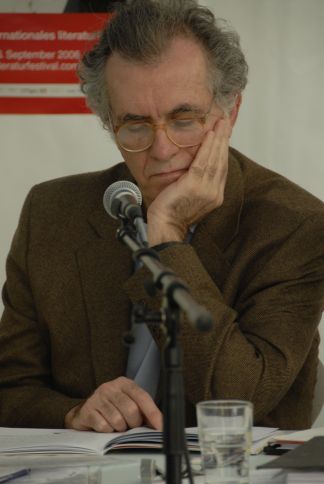
Ricardo Azevedo
The author and illustrator Ricardo Azevedowas born in the Brazilian megacity of Sáo Paulo in 1949 and is one of the most renowned writers for literature for children and young adults of his nation. After studying Visual Communication at university, he worked in advertising before writing his master’s thesis on popular stories in children’s literature in 1997. In 2004 he earned a doctorate with a study on the popular discourse about samba lyrics. Azevedo made his literary début in 1980 with the picture book “O peixe que podia cantar” (1980; t: The fish that could sing). Since then he has written over 100 picture books and stories for children and young adults, in addition to a series of poetic works which have been published all over the world. Even as a young adult, he had already started to bring together narratives and fairy tales and over and over again he focuses on the Brazilian oral-storytelling tradition. Thus, in “Contos de Espanto e Alumbramento” (2005; t: Tales of amazement and enlightenment), he retells popular stories in a style at once modern and poetic.
Ricardo Azevedo’s writings revolve around life’s universal questions and problems, and those dreams and anxieties, those passions and hopes which preoccupy young and old alike. Azevedo resists the notion of an exclusive “childlike universe”, commenting that “it is a cliché which fails to take the reality of children’s lives into account. Children and adults have always shared the same universe and will continue to do so. It is this fact that opens up endless possibilities for a writer.” Azevedo is a writer who does not simplify or explain anything; rather he turns everything on its head and communicates his ideas in a remarkably unconventional way. “Ninguém sabe o que é um poema” (2005; t: Nobody knows what a poem is) is a collection of thirty poems exploring the mystery of what poetry and the “Other” can mean for each individual. They allow young readers to question the weight of sadness and the limits of dreams. They discuss violence using the language of botany and make use of terms from physics in declarations of love. The author surprises his readers with each turn of the page, stirs their emotions and brings them to laughter or reflection. Sometimes he writes in Alexandrine verse, sometimes in unrhymed narrative – but always with precision, with a language full of wordplay and a great sense of rhythm. In his book for young adults “Pobre Corinthiano Careca” (1995; t: Poor Corinthiano Careca) Azevedo dedicated himself to one of his biggest passions – football. Inspired by encounters with street kids, he tells the story of Pedro, who loses himself in daydreams about everything to do with his favourite team, Corinthians de Sáo Paulo, and whose life is far from simple. He lives with his mother in poor surroundings and is unhappy in love.
As author of the book series “Fura-Bolo” (1999ff; t: Forefinger) – a scheme initiated by the Cargill Foundation – Azevedo is committed to providing children with free access to books, narratives and poetry. In 2004, the books were distributed to more than 60.000 pupils in the whole of Brazil. Ricardo Azevedo has been awarded the Prêmio Jabuti prize on three occasions (1989/91/99), as well as the Prêmio Banco Noroeste in 1984 and the Critics’ Prize of Sáo Paulo in 1995. His illustrations have been exhibited in various cities, including Bologna, Tokyo and Bratislava. Azevedo is a freelance writer and lives with his family in Sáo Paulo.
© internationales literaturfestival berlin
Dezenove poemas desengonçados
Ática
São Paulo, 1998
Lúcio vira bicho
Companhia das Letras
São Paulo, 1998
Pedro träumt vom großen Spiel
Bertelsmann
München, 1997
[Ü: Nicolai von Schweder-Schreiner]
[Ill: Silvio Neuendorf]
Um homem no sótão
Ática
São Paulo, 2001
Trezentos parafusos a menos
Companhia das Letras
São Paulo, 2001
Ninguém sabe o que é um poema
Ática
São Paulo, 2005
O peixe que podia cantar
Edições SM
São Paulo, 2005
Contos de espanto e alumbramento
Scipione
São Paulo, 2005
Aula de carnaval
Ática
São Paulo, 2006
